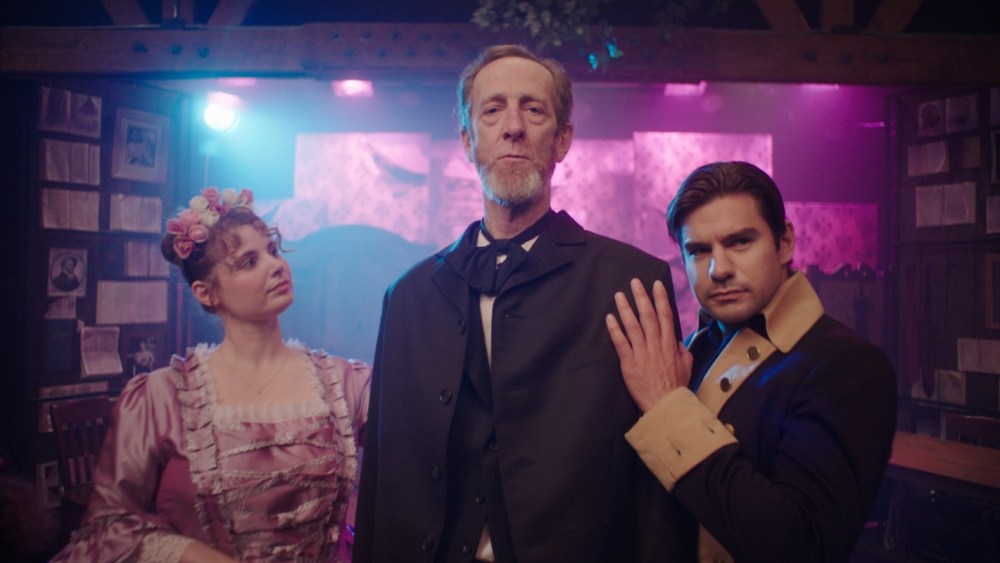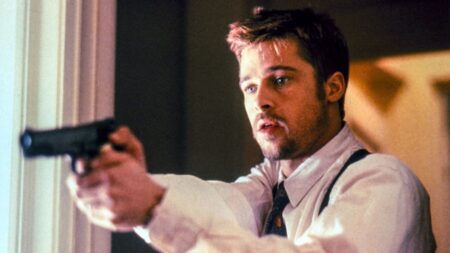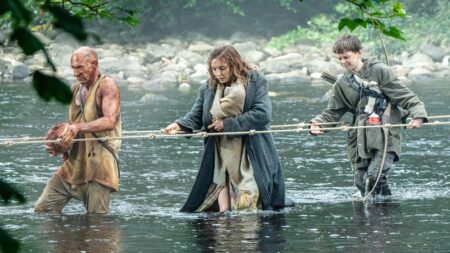The flair for the theatrical is at the core of “Lavender Men.” The film is set in a small theater where a rather mediocre play about Abraham Lincoln is being staged. But no sooner has the proverbial curtain come down on that self-serious proposition (with but a handful of people in the audience) than Lovell Holder’s film, co-written by creator and star Roger Q. Mason, truly begins. Described as a “fantasia” created within the mind of Mason’s Taffeta (the play’s stage manager), “Lavender Men” is a heady and meta-theatrical excavation of Lincoln’s long-rumored gay affair that’s wildly ambitious if a tad overstuffed.
“Lavender Men” began, as seems obvious from its logline, as a play. With Taffeta, a self-described Black, Filipinx, queer plus-size character, Mason devised a theatrical conceit wherein the stage would help recast the sanitized version of Lincoln the U.S. has been presented in schools. The theater itself, as well as the sound of a single bullet, become the central motif of the film — a nod, it would seem, to Abraham Lincoln’s most infamous night at the theater. Except, as the film unfolds and what we watch is a surreal reworking of Lincoln’s love affair with young Elmer Ellsworth (who died of a single shot, becoming the first casualty in the Civil War), it seems clear Mason is hoping to entwine the legacy of both men in a space that allows them both to reenact (pun intended) the life they led but which has been written out of their respective legacies.
Immersing us in Taffeta’s “fantasia” (a word that openly echoes Tony Kushner’s epic “Angels in America” plays, dubbed as they were “A Gay Fantasia on National Themes”), Mason’s “Lavender Men” staunchly believes in the power of the theater. Taffeta is staging their own revisionist history, which is so in vogue, they tell us, in many of the fourth-wall-rupturing quips that litter the film. They recast Abe as a young stud they’d eyed in the audience during the performance (Peter Ploszek) and who they later learned was there to watch his budding partner playing Elmer on stage (Alex Esola). The tacit rejection they’d felt upon walking in on those two handsome men hooking up backstage, alongside their unrequited crush on the play’s director (Philippe Bowgen) and the unsavory interaction they have with the aging actor playing Lincoln (Ted Rooney) is what fuels Taffeta’s journey into their own wayward imagination.
Soon enough, they begin orchestrating scenes between Abe and Elmer that flesh out the illicit relationship they nurtured in secret. As narrator, character, audience and actor, Taffeta embodies the wild possibilities of history retold. Perhaps, they suggest, they could very well write a different ending for Abe and Elmer, a tantalizing offer both characters (or is it actors? or figments of Taffeta’s imagination?) cannot possibly refuse. Blurring their own life and Lincoln’s, turning their sexual and romantic frustrations into fodder for a late-night daydream into queer history reimagined, Taffeta dredges up questions about visibility and representation that are decidedly contemporary.
What is Taffeta gaining, after all, in being so invested in the sex life of the senator who would become America’s 16th president? Why are they so insistent on writing themselves into the fabric of that history, playing roles as distinct as Mary Todd Lincoln and a chandelier (yes, really)? And why does that stagebound project allow them to muse and recast their own anxieties about moving through the world as an individual who is constantly running up against a world that proudly bellows “No Fats, No Femmes, No Blacks” in their face?
There is an intellectual rigor to these questions. And it makes sense that Mason would have turned to the theater to explore them. The stage, after all, allows for a porousness between past and present, reality and fiction, role-playing and reenactment. It’s why the likes of Kushner, Tom Stoppard, Adrienne Kennedy, Suzan-Lori Parks, and even Jeremy O. Harris have found in it a fertile space in which to explore how history can be reappraised and how bodies can revive old ideas in modern contexts. On-screen, such appeals to the power of the theater — which Holder insists on highlighting by having Taffeta and the film’s various other characters at times be actors, at others audience members, always attentive to the blurred lines between them — ring rather hollow. Or rather, their effect is rather blunted: The literalism of the screen doesn’t serve Taffeta’s vision, let alone Mason’s, quite as well as the stage likely did.
A film like “Lavender Men,” which spells out its timely, thorny thesis with verve, deserves to be admired. Alongside Shaun Peterson’s documentary “Lover of Men: The Untold History of Abraham Lincoln” and Cole Escola’s Tony-winning play, “Oh, Mary!,” Mason and Lovell’s collaboration is clearly at the forefront of a queer reclaiming of that most revered of American presidents. If the result is at times clunky (its cinematography quite claustrophobic and stilted; its pacing rather listless), there’s no denying Mason’s vision for a welcome version of queer historiography that connects past and present to imagine a brighter and more vibrant future.
Read the full article here








